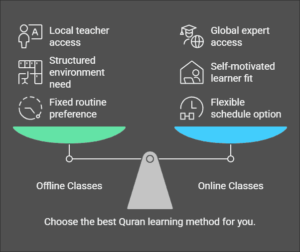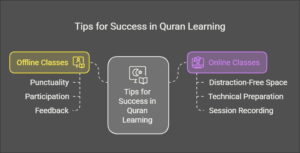Learning the Quran is a spiritual journey that strengthens one’s connection to Allah (SWT). With the rise of technology, students now have two main options for learning the Quran: offline classes or online classes. Each approach has its benefits and challenges, and the decision depends on individual preferences, lifestyle, and learning goals.
In this guide, we’ll provide a detailed comparison between offline and online Quran classes, exploring their pros and cons, ideal audiences, and factors to consider when choosing the best option for yourself or your child.
Understanding Offline Quran Classes
What Are Offline Quran Classes?
Offline Quran classes involve traditional in-person teaching. Students attend a physical location such as a mosque, madrasa, or Quran school. These classes follow a structured curriculum and are led by experienced Quran teachers.
Pros of Offline Quran Classes
- Direct Interaction with the Teacher
Students benefit from face-to-face communication, which allows for immediate corrections and hands-on guidance. - Community and Socialization
Students can interact with peers, fostering community and shared learning. - Structured Learning Environment
The disciplined and focused atmosphere helps students remain attentive and consistent in their studies. - Physical Presence for Younger Students
Teachers can better manage young children in person, ensuring they remain engaged.
Cons of Offline Quran Classes
- Limited Flexibility
Fixed schedules may not suit everyone, especially those with busy lives or irregular routines. - Time and Travel Constraints
Traveling to a physical location can be time-consuming and inconvenient, particularly for those living in remote areas. - Limited Teacher Options
Students are restricted to local teachers, which may limit access to highly qualified or specialized instructors. - Higher Costs in Some Regions
Tuition fees, transportation costs, and other expenses can make offline learning less economical for some families.
Understanding Online Quran Classes
What Are Online Quran Classes?
Online Quran classes are conducted over the Internet using platforms like Zoom, Skype, or specialized e-learning portals. They offer one-on-one or group sessions and are accessible from anywhere in the world.
Pros of Online Quran Classes
- Flexibility and Convenience
Students can schedule classes at times that suit their routines, making it easier to balance Quran learning with other commitments. - Access to Qualified Teachers Worldwide
Online learning removes geographical barriers, enabling students to learn from expert Quran teachers globally. - Cost-Effective
Online classes often have lower tuition fees compared to offline classes, and there are no transportation costs. - Personalized Learning
One-on-one sessions allow teachers to focus entirely on the student, tailoring lessons to their specific needs and pace. - Technology-Enhanced Learning
Interactive tools such as digital whiteboards, recorded lessons, and Quran apps make learning engaging and effective.
Cons of Online Quran Classes
- Dependence on Technology
A stable internet connection and familiarity with online tools are essential, which can be challenging in some areas. - Lack of Physical Interaction
Students miss out on the face-to-face engagement and community feel of offline classes. - Distractions at Home
A home setting may have distractions, especially for younger students, impacting focus and productivity.
Key Differences Between Offline and Online Quran Classes
|
Feature |
Offline Quran Classes |
Online Quran Classes |
|
Interaction |
Face-to-face communication |
Virtual interaction via video/audio |
|
Flexibility |
Fixed schedules |
Flexible class timings |
|
Accessibility |
Limited to local teachers |
Global access to qualified tutors |
|
Learning Environment |
Structured and disciplined |
Self-paced and home-based |
|
Cost |
Often higher (travel, fees, etc.) |
Generally more affordable |
|
Use of Technology |
Minimal |
High reliance on tech tools |
|
Community Building |
Stronger sense of community |
Limited social interaction |
Choosing Between Offline and Online Quran Classes

- Your Schedule and Availability
- Choose online classes if you have a busy or unpredictable schedule.
- Opt for offline classes if you prefer a fixed routine.
- Learning Style
- Offline classes are ideal for those who thrive in structured environments.
- Online classes work well for self-motivated learners who prefer flexibility.
- Access to Qualified Teachers
- If local options are limited, online classes provide access to global experts.
- For hands-on guidance, offline classes are a better choice.
- Budget
- Online classes are typically more cost-effective, making them suitable for families on a budget.
- Offline classes may involve higher costs, including travel expenses.
- Age and Learning Needs
- Younger children may benefit more from the physical presence and supervision of offline classes.
- Adults and older students often prefer the convenience of online learning.
- Internet and Technology Access
- A reliable internet connection is essential for online learning.
- If this isn’t available, offline classes are a better option.
Tips for Success in Quran Learning

For Offline Classes
- Be punctual and consistent in attending classes.
- Actively participate in group discussions and activities.
- Seek regular feedback from your teacher to improve.
For Online Classes
- Create a distraction-free learning space at home.
- Test your internet and devices before each class.
- Record sessions (if allowed) to revisit lessons later.
FAQs About Offline and Online Quran Classes
1. Which option is better for beginners?
Online classes are great for beginners due to personalized one-on-one sessions, but offline classes provide a disciplined environment that some students may find helpful.
2. Can children learn the Quran effectively online?
Yes, with interactive tools, engaging tutors, and parental support, children can learn the Quran effectively online.
3. Are online Quran classes more affordable than offline ones?
Generally, online Quran classes are more affordable due to lower tuition fees and no transportation costs.
4. How do I choose the best Quran class for my child?
Consider factors like teacher qualifications, class flexibility, affordability, and your child’s learning preferences.
5. What if I don’t have a reliable internet connection for online classes?
Offline classes are the best alternative if internet access is unreliable.
Conclusion: Which is Right for You?
Both offline and online Quran classes have unique advantages, and the choice depends on your personal needs and circumstances.
- Choose offline classes if you value face-to-face interaction, a structured environment, and a sense of community.
- Opt for online classes if you need flexibility, access to global teachers, and a cost-effective solution.
Ultimately, the most important factor is consistency and dedication to learning the Quran. Whichever method you choose, stay committed to your journey and seek Allah’s (SWT) guidance throughout the process.
📚 Ready to begin? Explore our range of online and offline Quran classes to find the perfect fit for you or your child.



